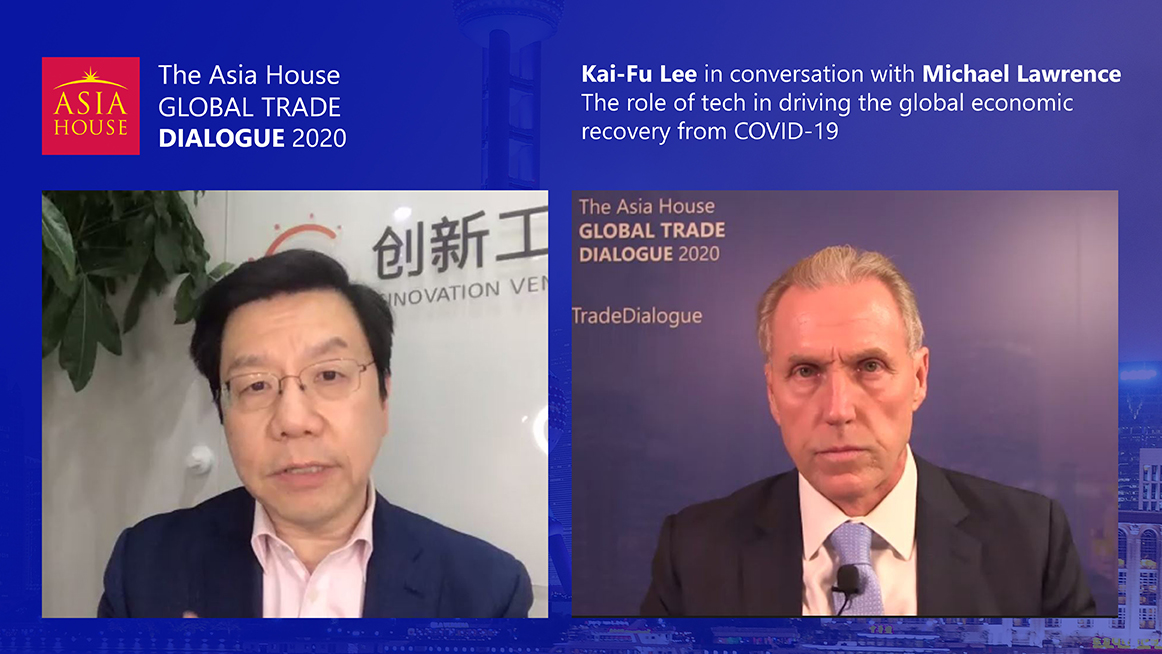Driving commercial and political engagement between Asia, the Middle East and Europe
Driving commercial and political engagement between Asia, the Middle East and Europe
Driving commercial and political engagement between Asia, the Middle East and Europe

The digital trends being accelerated by the COVID19 crisis are driving major business opportunities, but are also creating unprecedented challenges for policymakers, according to leading AI pioneer Kai-Fu Lee.
Speaking at the Asia House Global Trade Dialogue on 7 December, Lee outlined how rapid digitisation is having profound effects on consumer habits and business outcomes. He cited the explosion of live streaming retail in China during the pandemic – a sector that has boomed “from almost nothing last year to US$200 billion of ecommerce transactions” – as indicative of how shifting consumer trends are heralding huge returns. Online retail in China is now bound up with entertainment – an example of how gamification is being applied to commerce.
WATCH KAI-FU LEE IN CONVERSATION WITH MICHAEL LAWRENCE HERE
Lee predicted that this gamification could also transform other sectors, expressing particular optimism about innovation in the learning environment. “I’m really excited about AI in education,” Lee said, during a Q&A with Asia House Chief Executive Michael Lawrence. “AI can be used to turn online learning into a gamified, fun, interactive and engaging virtual-teaching experience.”
AI and automation are also revolutionising other economic areas, with robotics set to continue driving efficiencies in manufacturing, Lee said. In China’s case, this is likely to see the country maintain its status as “the world’s factory.”
“There is a very strong desire within the government and within companies,” Lee said, “to stay ahead of the curve in automation.” This will keep costs down and keep factories in China.
However, more broadly, the speed towards digitalisation has been “more rapid than originally anticipated,” with COVID19 driving people online in record numbers. And, as “with all nascent technologies, there will be unexpected problems,” Lee warned.
These include job losses and the rise of security risks as AI technologies become more accessible.
“AI’s greatest power is replacing routine tasks,” Lee said, noting how routine tasks are part of many current jobs, which will be replaced by AI. “Going forward, people will need to retrain themselves and find skills that AI cannot do.”
“I think governments and companies will need to develop programmes – maybe embrace Universal Income, provide retraining and think about the future of education,” Lee said.
The widespread adoption of AI will also present security risks for society. “The barrier of AI is dropping, which is wonderful for companies that want to embrace AI, but it is also dangerous. For the same reasons that people can use AI to catch fraud, people could use it for fraud.”
“AI’s power in the hands of the wrong people, with barriers dropped, is something we need to watch out for.”
Given the power of AI and the influence it will have on our lives as it reshapes societies, Lee called for AI practitioners to be aware of the impact of their work.
“We need to train AI engineers and scientists to realise they bear great responsibilities,” he said. “They’re not just writing some code – they are affecting fairness and potentially people’s health and people’s lives. This is really important.”
